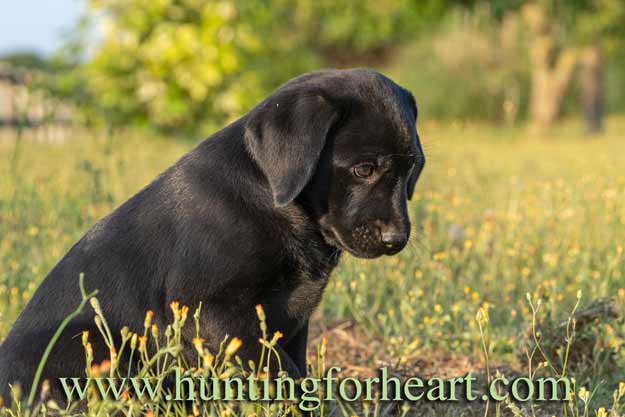Puppy Potty Training Schedule
by Ellen Landauer
A puppy potty training schedule should be very simple. One thing that makes it complicated is us!
I'll explain, as well as giving you an in-depth understanding that will help you succeed.

Using a crate to prevent your puppy from eliminating in the house is essential, as it does a lot of the training for you. You will be calmer knowing 1) your puppy is safe from harm, 2) your possessions are safe 3) you do not have to worry about how to handle puppy misbehavior in the house - it won't happen if you follow the guidelines expressed here.
A safe 'den' for your pup gives you peace of mind. Your resulting calmness is good for both you AND the pup. YOUR emotional state is the 'atmosphere' in which they 'marinate.' They will resonate to your stress or calmness - same as we do around our fellow humans.
To use a crate properly, you or a dependable caretaker if needed - will be taking your pup outdoors many times per day.
Puppy Potty Training Schedule:
Emotional Issues (Yours)
In implementing a puppy potty training schedule, you take your pup out many times a day to eliminate, play and bond with you. BUT - you also have things to do for you, your family, work, etc. At those times, you hope your pup will take a nap, chew a toy and be calm in the crate.
It doesn't always work that way. Not long after (or sometimes immediately after) you have spent a generous amount of time outside with your pup, you may hear them whining and fidgeting in the crate. What to do?
If they've just been out, give them 10 or more minutes to calm down.
One thing that WILL cause 'separation anxiety' is when you JUDGE yourself and feel guilt for leaving them in their crate.
Your little one is VERY tuned in to your emotional state - if you are anxious, they will be, too! This does not bode well for their calmness in their 'den.'
When guilt arises... Try doing a little mental review of all the hazards, both physical and emotional, that their safe cozy crate protects them from. Short list: chewing an electric cord, eating something poisonous, your anger when they destroy rugs, etc., accidentally getting out the door and running across the street...
There - do you feel better now?
Acquiescing to Guilt
Leads to Poor Decisions
A puppy potty training schedule should NOT include guilt on your part!
When your pup whines in their crate, guilt may arise that you didn't do enough for them or didn't do it 'right.' If you acquiesce to guilt, you may decide to let the pup have 'a little free time' in the house. Guaranteed they will soon do something you don't want them to do.
They may chew, knock over or jump on something you value, or even on you or family members. They may eat something like a sponge or rag that could block their digestive tract, or something toxic - necessitating a stressful, painful emergency vet visit and possible invasive surgery. They may eliminate indoors, which is sure to compromise your goal of housetraining them.
The emotional price of 'a little freedom in the house'... To stop them from continuing one of those very pleasureable (for them) problematic (for you) activities, they must be startled out of it. Even 'kinder / gentler' interruptions such as clapping hands, calling attention to something other than the destructive behavior - creates an emotionally painful collapse of the very open, free flow of energy that they were enjoying while chewing, stealing your food or eliminating in the house.
Pups only stop doing such fun activities as ripping up couch cushions when they are startled. Habitually startling a pup creates tension, built up frustration and an unchanneled explosive charge of bound energy that will only lead to future behavior problems. It will also undermine health, as stress does with all of us.
Trying to control a behavior is reinforcing it. To regain balance from being compressed emotionally, the pup either has to push back, or if they are of milder temperament, collapse emotionally. The signs of emotional stress are all too often regarded as normal. The more you contest a young puppy over behavior, the more likely you will see other often more serious issues emerge - either aggressive or fearful.
If you have a very mild-tempered dog that you can easily frighten out of doing things you don't want them to do, the tendency is for the dog to go into avoidance. The emotional collapse generated by experiences of fear during puppyhood lives in the grown dog of mild temperament as stress that may make them hesitant and lacking confidence and composure. In a dog with strong drive, the same path can lead to dangerous aggression. Stress also corrodes health.
Spending time in a crate when indoors is far better for a pup than being frightened out of undesired behaviors while 'free' in the house. (My trainer, Kevin Behan, would say, "The primary purpose of the crate is to protect the pup from the owner)!"
So you can let go of some of that guilt, knowing that the less you reprimand and try to control behavior, the more your bond with your dog will flourish. There are specific ways to provide corrections that do NOT damage temperament - but these should not be used on a little puppy. That is a subject for another article...
Calm Consistency and Crate Training: Essential to Puppy Potty Training Schedule
A competent puppy potty training schedule prepares your new friend to see indoors as a place to keep clean and in which to be at ease.
Each time you want your little one to go into their 'den,' guide them there with treats and toss a few into the back of the crate. When you close the door and walk away, they will still be sniffing out their treats. ALSO, feed all meals inside the crate.
IMPORTANT: Ideally you should provide a sturdy enclosed plastic crate rather than wire crate. Wire crates can be dangerous if a young pup gets frantic and tries to push their way out between the walls, or a wall and the floor. If they get their head through, their neck can be compressed by the wire frame and stop their breathing. Also, an enclosed plastic crate cuts down on excessive visual stimulation resulting from anything going on around them - allowing them to feel safer, more enclosed and relaxed. The crate should be in a quiet room for the same reason.
HELPFUL NOTE: Placing your pup's crate right next to the door that leads to the yard (assuming your yard is fenced) makes it easy to just open the crate and let them out. Even if you need to use a lead to walk them, this strategy will help avoid 'accidents' as you and your pup exit the house.
Silence is Golden
A successful puppy potty training schedule is also the result of YOUR calmness and your sensitivity to your pup's emotion. Here's an effective approach to this issue:
Calm neutrality on your part will allow the natural scents of the earth to stimulate your pup to eliminate. All the suggestions to repeat, 'Go potty,' or other mantras, then fuss over the dog with praise, petting and treats once they eliminate - is ill-advised! Your pup just had the pleasureable and satisfying experience of eliminating outdoors. THAT is PLENTY of reward.
Put yourself in the pup's place - could you easily relax and eliminate if someone is hovering over you and giving you all kind of advice on how to do this very natural function?? Would you be embarrassed to then be praised and wined and dined for pooping??
Give your pup an undisturbed emotional space to eliminate!
Give Your Pup the Benefit of the Doubt!
Here's my strategy:
If a pup is fussing in the crate for more than a minute or two, or sometimes less, especially if they haven't been outdoors for 40 minutes or more, I ALWAYS GIVE THEM THE BENEFIT OF THE DOUBT. I don't know whether they really need to eliminate because THEY are the one feeling sensation in their own body - not me. Even right after being outdoors, they may need to go, for example if they have diarrhea.
At such times, I take them outdoors and give them a few minutes of quiet walking about to eliminate. If they seem to want to play, I don't take offense and imagine they are 'manipulating' me. I am approachable but do not engage in high energy games or play. A little calm massage of their spine gives some contact and also may help relax them more so they can eliminate if they actually need to. Then, back to the house and a few treats to help them enjoy going back into the crate.
After a second time taking them outside, and they are safely back in the crate, I calmly go about my business and give the pup more time to calm down and take a nap. At that point I have pretty much determined that they don't have an urgent need to eliminate. I give them time to find their own calm space and maybe take a nap.
After leaving them in their crate, you don't want to talk to them, try to reassure them, etc. That adds energy to the situation, making it harder for them to be quiet and composed. Calm, neutral demeanor on your part helps them the most. They will resonate to your emotional state - after all, dogs ALWAYS know what you are feeling. That is one of the things we love about them - and they are EXTREMELY good at it.
The only time I talk to my pup when in the crate is if they need to go out and I have to take a minute to pull on some clothes. I just calmly say, 'be right there,' or some such - and it gives them a pause and a little distraction from any urgency to eliminate - just buys a little time so I can help them succeed in getting outdoors.
I ALWAYS take a pup out are after they eat or drink, and when they wake up from a nap. When very young, you will want to take them out in the middle of the night. Of course first thing in the morning when you get up, take them outdoors immediately.
Time is On Your Side
The natural process of maturing temperament and physical capabilities is a lot of what 'trains' your dog. It is the effortless part of a puppy potty training schedule.
Temperament development takes pup from general to specific. For example, most pups will try to bite and chew almost everything and everyone. When properly channeled in fun games to bite a toy, they will hone in on that as their object of desire, rather than your ankle or a couch cushion.
Same with housetraining: As your pup grows to see their crate as a secure resting place, to see YOU as the answer to their needs and learns that outdoors is the place for eliminating, running and playing - they will become more reliable and once fully mature, a great companion indoors as well as outdoors.
BUY 'Hunting for Heart' and
Rediscover Your Primordial Bond With Dogs
BUY the
Book
HEALTH INFO
FOR YOU
My other website:
Peak health helps you have more energy to enjoy your dog!
